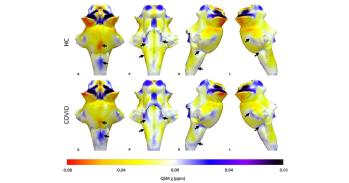
47% of parents in a national survey reported negative experiences of giving birth during the pandemic in 2020, with uncertainties about rapidly changing restrictions and poor communication from healthcare providers causing them increased anxiety and distress.
47% of parents in a national survey reported negative experiences of giving birth during the pandemic in 2020, with uncertainties about rapidly changing restrictions and poor communication from healthcare providers causing them increased anxiety and distress.
This study highlights the importance of good communication in giving women the feeling of control over their childbirth experience, and mitigating the anxiety they feel
Ezra Aydin
This is in contrast with 33% of parents who said they had a positive experience, and 20% who had a ‘neutral’ experience of giving birth in England during this time.
These are the findings of a study of women’s birth experiences in England during COVID-19, published this week in the journal BMC Pregnancy and Childbirth.
The authors say these predominantly negative childbirth experiences appeared to be linked to a loss of choice and control, and lack of clear communication from healthcare providers.
Information was collected by online survey between July 2020 and March 2021 from 477 families, as part of a larger national study called ‘COVID-19 in the Context of Pregnancy, Infancy and Parenting’ (CoCoPIP). Parents living in England with an infant between the ages of 0-6 months were asked to report on their recent experience of giving birth.
“Many expectant mothers said that the constant changes to government guidance caused them heightened anxiety and distress, in particular because they didn’t know whether they could have a birth partner with them during labour and birth,” said Sarah Lloyd-Fox in the University of Cambridge’s Department of Psychology, senior author of the paper.
She added: “Choice and control are so important in women’s childbirth experience – and lack of both during the pandemic restrictions in 2020 had an adverse effect on the experiences of many pregnant women in England.”
Parents reported mixed experiences of communication from hospitals and midwives prior to the birth of their child: some received almost no communication, which added to their anxiety, while others received very clear information about what to expect at the birth while pandemic-related restrictions were in place.
40% of respondents said they had been uncertain about whether their birthing partner would be allowed to attend the delivery of their baby. Despite this, only 2.3% had no birthing partner present at the time of the birth due to COVID-related restrictions.
25% of respondents reported COVID-related changes to the delivery of their baby. The suspension of home births and birthing pools during early 2020 restrictions reduced parents’ feelings of control. Some women reported difficulties accessing pain-relief and assistance.
“This study highlights the importance of good communication in giving women the feeling of control over their childbirth experience, and mitigating the anxiety they feel,” said Ezra Aydin in the University of Cambridge’s Department of Psychology, first author of the paper.
She added: “When restrictions due to the pandemic were changing from one moment to the next, some NHS trusts created Facebook or WhatsApp groups where people could ask questions – and that helped expectant parents feel a bit more at ease in such an uncertain time.
“When families were provided with support, and had input into decision-making about the birth, they reported a more positive experience - with reduced levels of anxiety and stress.”
In March 2020 the first national UK lockdown was announced in response to COVID-19, and NHS trusts began to suspend home birth services as resources were diverted to the pandemic. Individual NHS trusts were required to draw up their own guidance on access to maternity services and birth partners, based on government guidelines.
The authors say their findings show the need for clear and consistent guidance to be in place for expectant women giving birth during future lockdowns and public health crises. This should include allowances for choice of delivery methods, and the availability of consistent support for the duration of the labour and birth.
The CoCoPIP Study was developed to explore how COVID-19 and the cascade of changes in healthcare, social restrictions and government guidance impacted the lives of families who were expecting a baby or had recently given birth. The results reported in this paper focused on parents’ experiences of giving birth during the pandemic, including the ways in which communication and advice provided by hospitals may have influenced these experiences.
In early September 2020 NHS England issued guidance to individual NHS trusts to reintroduce access for partners, visitors and other supporters of pregnant women in English maternity services – however this was adopted inconsistently. In December 2020 this guidance was further revised to explicitly allow in-person support for expectant women throughout their maternity journey, including antenatal visits, ultrasound scans, and during the birth.
The researchers acknowledge that the experience of the pandemic in 2020 was a unique period of hardship for everyone. The aim of their study is to give a voice to expectant and new parents during this time. The CoCoPIP study will continue to monitor the babies until they are 18 months old to follow their development into toddlerhood.
This research was funded by the Medical Research Council and UK Research and Innovation.
Reference
Aydin, E et al: ‘Giving birth in a Pandemic: Women’s Birth Experiences in England during COVID-19.’ BMC Pregnancy and Childbirth, April 2022. DOI: 10.1186/s12884-022-04637-8

The text in this work is licensed under a Creative Commons Attribution 4.0 International License. Images, including our videos, are Copyright ©University of Cambridge and licensors/contributors as identified. All rights reserved. We make our image and video content available in a number of ways – as here, on our main website under its Terms and conditions, and on a range of channels including social media that permit your use and sharing of our content under their respective Terms.




